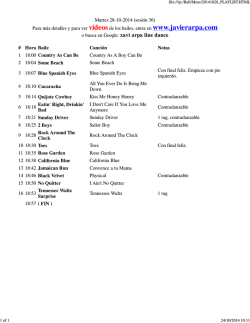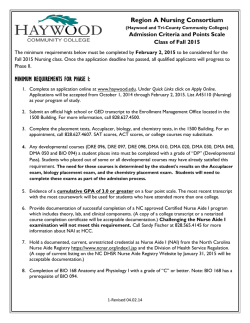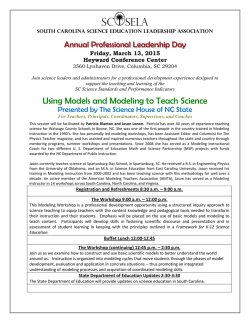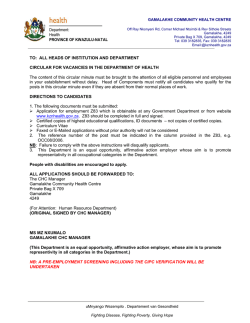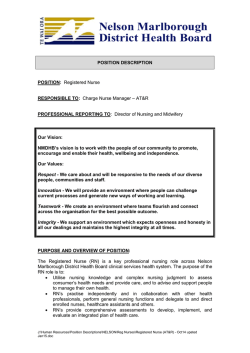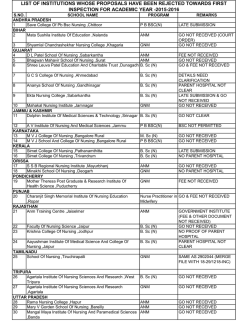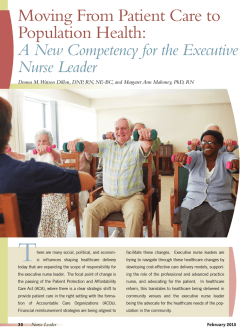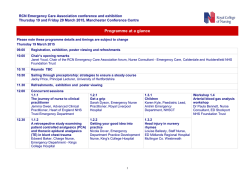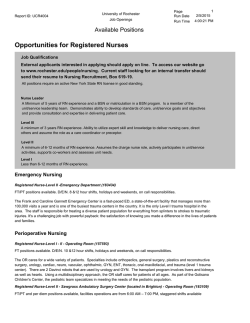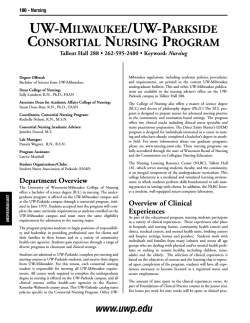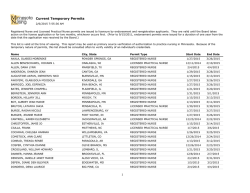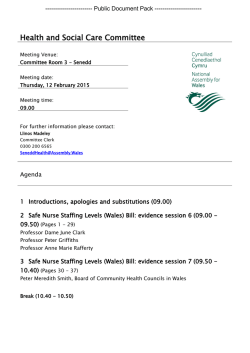
e CON N E C T I O N S - Medical University of South Carolina
eCONNECTIONS FEBRUARY I N S I D E NEWS................................................... P. 2 CALENDAR......................................... P. 3 ACADEMICS.......................................P. 4 RESEARCH......................................... P. 5 PRACTICE...........................................P. 6 | 2015 Number one. Best of the best. Top of the list. Creme de le creme. FACULTY & STAFF NEWS................. P. 7 PUBLISHED BY: Medical University of South Carolina College of Nursing 99 Jonathan Lucas St., MSC 160 Charleston, SC 29425 SEND INQUIRIES TO: [email protected] Congratulations to all faculty, staff, students and alumni for helping the MUSC College of Nursing achieve the number one ranking in online graduate nursing in the country. We could not have done it with you. NEWS & NOTES A warm welcome at CON’s Grand Open House DIVERSITY & INCLUSION SPOTLIGHT New year brings a new name The College of Nursing’s Diversity and Inclusion Committee (formerly the Diversity Committee) continues to promote an environment of respect, teamwork and mutual understanding among students, faculty and staff. The working committee is dedicated to equity, access, and inclusion and includes Tiffany Williams, diversity officer; Carolyn Page, director of student services and alumni affairs; Ruthie Conner, Carrie Cormack, Tina Lopez (faculty); Sabrina Green, Libby Cole (staff); Liz Kreuze, graduate student; and Tiffani Smalls, undergraduate student. The committee’s goal is to attract, recruit, admit, retain and educate a diverse student body and faculty, while being understanding and accepting of all people regardless of social, cultural and economic background. These differences may be reflected in a number of ways including ethnicity, sex/gender identity and orientation, socioeconomic status, language, age, physical characteristics, disability, pregnancy, veteran status, country of origin, citizenship, religious or political beliefs, military status, and others. You can support the committee by valuing diversity and being inclusive of all. For additional information about CON’s Diversity and Inclusion Committee or diversity at MUSC, visit http://academicdepartments.musc. edu/nursing/about/diversity/ 2 FEBRUARY 2015 | eCONnections CALENDAR OF EVENTS FEBRUARY THU-FRI 12-13 MON 16 MON 16 WED 18 MARCH MUSC Board of Trustees Meeting MON-FRI all day | Colcock Hall 09-13 President’s Day MON CON open 16 Faculty Assembly WED 1 - 4 p.m. | CON 202 18 Staff Meeting MON 9 a.m. | CON 202 30 Spring Break CON open Faculty Assembly 1 - 4 p.m. | CON 202 Staff Meeting 9 a.m. | CON 202 Faculty Workshop: Evaluation & Assessment presented by Michael Bridges, PhD 9 a.m. - 4 p.m. (start time pending) | CON 221 Presidential Scholars Program Call for Applications The Dr. Raymond S. Greenberg Presidential Scholars is now seeking applications for the university’s interprofessional program for 2015-16. The Scholars Program is a two-semester experience for approximately 50 students, joined by selected faculty scholars from each college, as well as the Charleston School of Law. This extracurricular program allows students to bring an interprofessional perspective to the study of complex social, political, and human issues of broad interest to health care professionals and biomedical researchers. Scholars meet bi-monthly for dinner meetings and presentations; additional meetings to complete a group community project may occur. Other events include a trip to the SC State Legislature and dinner with MUSC President Cole. Previous Scholars have found participation in the program has greatly benefited their professional development. Deadline for applications is February 27, 2015. Click here to complete an application. The Office of Student Diversity and the Multicultural Student Advisory Board (MSAB) presents BlAck HiSTOry MOnTH 2015 “A Century of Black Life, Culture, History, and Health” Basic science Building (BsB) Room 302 • NooN - 1 p.m. (lunch will be provided for the first 50 guests) PreSenTerS 02.04.15 Willette S. Burnham, PhD., Assistant Professor, executive Director, Offices of Student Program and Diversity, co-chairperson for the Diversity and inclusion Strategic Planning committee for the MUSc enterprise 02.11.15 campus and community Diversity Panel 02.18.15 David cole, M.D., FAcS, President of the Medical University of South carolina 02.25.15 Vivian Bea, M.D., resident, Department of Surgery ebony J. Hilton, M.D., Assistant Professor, Anesthesia and Perioperative Medicine, Division of critical care Medicine eCONnections | FEBRUARY 2015 3 OFFICE OF ACADEMICS New DNP track: Executive Leadership and Innovation Recently the College of Nursing announced a new track for the Doctor of Nursing Practice (DNP) program that will open August 2015 pending approval from the Commission on Higher Education. The proposed Nurse Executive Leadership and Innovation program meets current national recommendations to prepare executive nurse leaders to transform health care. The DNP nurse executive is the bridge between the patient/family, community, interdisciplinary team, and administration. As nurses with advanced education, the nurse executive will be visionary and innovative. The proposed asynchronous online program will be completed in two years (seven semesters) and the flexibility of online education allows students to continue working while obtaining graduate education. The program will focus on providing nurses the knowledge and skills to be executive leaders who are competent, entrepreneurial and can transform health care and outcomes in an ever-changing healthcare system. The core competencies for the nurse executive include: knowledge of the health care delivery system and organizational environment: health care finance, policy, and management; communication and relationship management; and diversity and professionalism. Applicants must hold a BSN degree, but a masters degree may be an MSN, MHA, or MBA, as these degrees address the administrative role graduates of the program will be prepared to assume. Coggins receives scholarship Christin Coggins, accelerated BSN student has received the Elizabeth Ann Jones Alumni Scholarship. Coggins transferred to MUSC from the College of Charleston (CofC) where she was a member of the nursing club. While a CofC student, she completed the CofC Emergency Medical Technician course, as well as served as a volunteer for both the Roper Hospital SCRUBS program and MUSC HealthLinks. In 2014, she participated in the Palmetto Medical Initiative and traveled to Uganda, Africa with a team of physicians and nurses to provide care to rural villagers. Coggins shared this was a significant event, and that is has become her goal to become a medical missionary and providing quality care. One of Coggin’s references wrote, “she is well motivated, bright, cheerful, and enthusiastic. I believe she will be an outstanding nurse. Please educate her, and send her back to Spartanburg so she can make a difference in our community.” Students give back CON’s undergraduate nursing students contributed to an outstanding flu vaccination season at the Ralph H. Johnson VA Medical Center. As part of their clinical rotation, students, along with their instructors, staffed several immunization stations in the main lobby of the hospital. Veterans arriving for their primary care clinic appointments had the opportunity to get their flu injections with minimal time lost from their routine activities. The students administered shots, answered quesCharleston VA achieves 5-star rating, tions regarding the flu strains and sixth fastest growing VA in US allergy information, as well as provided The Ralph H. Johnson VA was again rated a 5-Star assurances that the vaccine really did not cause flu. Several Veterans even medical center, the highest possible rating accordagreed to be vaccinated for the first time, due to the “expert salesmanship” ing to VA’s Strategic Analytics for Improvement and of the student nurses. Learning Value (SAIL) model, and became the sixth In addition, the students utilized an appropriately designed mobile cart, fastest growing VA in the U.S. for percentage patient and traveled to offices and nursing units to make the flu vaccine availgrowth in the fourth quarter of fiscal year 2014. This able to all staff members. Many of the VA nursing staff had been bedside rating, which ranks the Charleston VA in the top educators to these students just a few months prior and felt confident in 10 percent of VA medical centers nationwide for their students’ abilities. quality of care and efficiency, was first achieved by With the collaboration of the College and VANAP faculty over 5,000 the Charleston VA in October 2014. Click here to injections were administered from September through December. Both read more. the Veterans and CON nursing students benefited. 4 FEBRUARY 2015 | eCONnections OFFICE OF RESEARCH Publications & presentations PUBLICATIONS > DeCristofaro, C., Murphy, P., Herron, T., & Klein, E. (2014) Using Guided Response to Stimulate Student Engagement in the Online Asynchronous Discussion Board. International Journal of Arts and Sciences, 7(3), 45-57. www.university- publications.net/ijas/0703/pdf/H4V646.pdf Submitted grant applications Mathew J. Gregoski, PhD resubmitted an application to the American Heart Association for the NCRP Winter 2015 Scientist Development Grant titled, “Personalized Prevention of CVD: Role of Genetics, Stress, and Behavioral Factors.” The first aim of this study will use a machine learning multivariate adaptive regression splines approach with Jackson Heart Study archival data (with subsample cross validation) to expand an endothelial system/autonomic nervous system pathway within a biobehavioral model to include additional sympathetic nervous system, endothelial system genes and environmental stressors, and hypertension/CVD outcomes. The second goal will be to systematically examine additional hypertension pathways using multivariate adaptive regression splines to detect genes by environment interactions and psychosocial characteristics related to hypertension/CVD among the Jackson Heart Study population. Generalized estimating equations based on the machine learning results will be calculated with results reviewed by an epidemiological expert with over 25 years of experience in hypertension studies to ensure appropriate inclusion of variable selection. The results will be used to determine effect-size for potential environmental exposure/ pharmacogenetic intervention strategies for future trials. Cathy Durham, DNP, APRN, FNP-C, has been awarded a grant opportunity as co-PI with James Sterrett, PharmD (College of Pharmacy) through the MUSC Interprofessional Collaboration Grant Pilot Project Program. Their grant is titled, “Interprofessional Partners in Healthcare: Integrating Telepharmacy Precepting and Consulting Optimizing Collaborative Care and Education in a Nurse Practitioner Clinic targeting the Medically Underserved.” The project started in January and will go for one year. NIH’s new biosketch format Science Experts Network Curriculum Vitae (SciENcv) is a new electronic system that helps researchers assemble the professional information needed for participation in federally funded research. SciENcv gathers and compiles information on expertise, employment, education and professional accomplishments. Researchers can use SciENcv to create and maintain biosketches that are submitted with grant applications and annual reports. SciENcv allows researchers to describe and highlight their scientific contributions in their own words. SciENcv (part of My NCBI), is offered by the National Library of Medicine. Access SciENcv at: http://www.ncbi.nlm.nih.gov/sciencv/. eCONnections | FEBRUARY 2015 > DeCristofaro, J. & DeCristofaro, C. (2014) Value-Added Hybrid Learning: Using OnlineResources in the Community Arts Adult-Education Setting. Journal of Teaching and Education, 3(2), 201-206. www. universitypublications.net/jte/0302/pdf/ H4V648.pdf Andrews, J.O.; Mueller, M.; Newman, S.D.; Magwood, G.; Ahluwalia, J.S.; White, K.; Tingen, M.S. (2014) The Association of Individual and Neighborhood Social Cohesion, Stressors, and Crime on Smoking Status Among AfricanAmerican Women in Southeastern US Subsidized Housing Neighborhoods. Journal of Urban Health, 1(6), 1158-1174. Spruill, I.; Magwood, G.; Nemeth, L.; Williams, T. (2015) African Americans’ Culturally Specific Approaches to the Management of Diabetes. Global Qualitative Nursing Research, 1(2), 1 –9. DOI: 10.1177/2333393614565183 > Gracie, D. (2015). Patient Engagement in Healthcare IT. In Patricia R. Sengstack & Charles M. Boicey (Eds.), Mastering Informatics: A Healthcare Handbook for Success (317-337). Indianapolis, IN: Sigma Theta Tau International. 5 OFFICE OF PRACTICE Advanced practice nursing bill introduced in SC House BY AMY WILLIAMS, MSN, APRN, CPNP W hen the 121st session of the South Carolina General Assembly convened in January, Representative Jenny Horne’s APRN Reform Bill, H.3078 was introduced. The bill has eight sponsors and was referred to the committee on Medical, Military, Public and Municipal Affairs (3M Committee) on January 13. The proposed bill will remove ratios of APRNs working with physicians (currently it is one physician to three APRNs), remove the 45-mile physician supervision law, and give APRNs schedule II prescriptive privileges. South Carolina is one of 31 remaining states that have limits on APRN scope of practice that do not allow the advanced graduate-level nurse to practice to the full extent of her/his education and training, which includes diagnosing, prescribing medications, treating and referring patients. When introduced in early December, the bill had letters of support from physicians, agencies and patients across the state in both rural and suburban areas. These letters asked the General Assembly to remove barriers to the APRN profession, allowing them to practice to “When APRNs are free from undue supervision requirements and other undue practice restrictions, they can more efficiently fulfill unmet health care needs.” - Federal Trade Commission Policy Paper their fullest extent and give more South Carolinians access to care throughout the state. This comes at a time when more than 800,000 new patients will enter the health care marketplace because of the implementation of The Affordable Care Act. South Carolina struggles with caring for many of it’s citizens, ranks 45th on the national health care report card, ranks 33rd for the lowest number of primary care physicians, and falls in the bottom five for unhealthiest states. Part or all of the state’s 46 counties receive a medically underserved designation by the South Carolina Department of Health and Human Services. Furthermore, the American Association of Medical Colleges Center for Workforce predicts that there will be a shortage of 63,000 physicians by 2015, and 130,600 by 2025. This is occurring while the number of nurse practitioners in the US will increase by 94 percent by 2015. States with full scope of practice have better health outcomes than South Carolina. Despite these staggering statistics, the bill is expected to meet opposition. What needs to be done? All nurses and APRNs working in South Carolina need to contact their state representatives and senators (visit www.SCStatehouse.gov to locate your representatives) and ask them to support the APRN reform bill, H.3078. APRNs can send a letter (not an email) that describes how the current laws restricts practice. Using pen and paper may be the most effective way to communicate with your representative. We have learned that many representatives and/or their aides are more likely to read letters, but only count emails. Additionally, phone calls are useful. Call members of the 3M committee to request that Chairman Howard hear the bill as soon as possible and “Vote Yes” when the bill is debated on the floor. Attention: Health care professionals At the completion of this event, participants will be able to: • Discuss the foundations of community-based palliative care • Identify legal and regulatory components of community-based palliative care • Describe coding, billing and financial aspects of community-based palliative care • Distinguish successful community-based models of palliative care • Implement “best practices” in community-based palliative care services 12:30 - 5:45 p.m. | College of Nursing | Room 202 (both days) 6 There is a $20 processing fee for CE credit for nurses, physicians and social workers to be paid online www.NHPCO.org (you must create an account and complete an evaluation). Seats are limited. Click here to sign up for event. FEBRUARY 2015 | eCONnections FACULTY & STAFF NEWS Wins Suparna Qanungo, PhD, research assistant professor, was recently highlighted by the Office of Development and Alumni Affairs about her philanthropic work in the children’s welfare home in rural India. Read about her story, “College of Nursing researcher helps to provide better future for girls in India” here. In addition, Qanungo completed advanced training in data management for clinical trials from Vanderbilt University in December. Being the stellar student, she completed the course with distinction by scoring 97.5 percent. Kahlil Demonbreun, DNP, RNC-OB, WHNP-BC, ANP-BC, instructor, has received the 2015 AANP Nurse Practitioner State Award for Excellence from South Carolina. A reception will be held for recipients from each state in New Orleans, LA in June. FEBRUARY 2015 Some colleges say more men are entering nursing programs Marisa Torrieri | Healthcare DIVE Look who Professor Elaine Amella ran into at the AACN Doctoral Education Conference in San Diego, CA... recent PhD graduate, Dru Riddle. Riddle succesfully defended his final dissertation on January 9. Congratulations! One important key to success is self-confidence. An important key to self-confidence is preparation. “ | What I learned about love as a pediatric nurse Kateri Allard, RN | The Huffington Post “ The CCNE accreditation evaluation will take place September 28-30, 2015. eCONnections An interview with President David Cole: 2015 - A strategic approach to a new year Mikie Hayes | The Catalyst Each year, a new edition of MUSC’s Humanitas affords MUSC members the unique opportunity to celebrate the humanities via publication of original short stories, poetry, music, photography, paintings, etc. Submissions will be accepted through February 14 for the following categories: written word, photography, visual art, and music. Visit the Humanitas website for more information and to view previous editions. MARK YOUR CALENDAR NO execeptions will be allowed. U.S. News’ best health care jobs: Nurse practitioners topped physicians The Advisory Board Company Showcase your creativity WELCOME TO THE WORLD Terri Fowler and her husband, Matt welcomed a baby boy on January 9 at 11:55 p.m. Jake Lucas Fowler weighed in at 7 lbs., 8 oz. Congratulations! All faculty and staff are required to be in attendance. No annual or professional leave will be granted during these dates. CON Newsfeed — Arthur Ashe 7
© Copyright 2026
